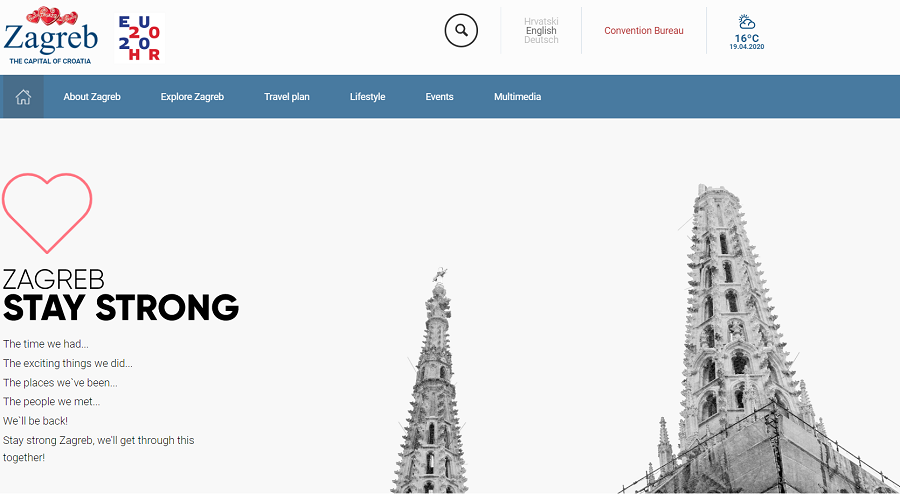Slovenian President Pahor to Croats: We Will Defeat Coronavirus Together
ZAGREB, April 19, 2020 - Slovenian President Borut Pahor on Sunday sent a message of solidarity and encouragement to Croatian President Zoran Milanović and all Croatian citizens, saying we will defeat coronavirus together.
"We deeply admire the Croatian people which is showing determination, courage and hope in these difficult times," Pahor tweeted.
"Slovenia feels your sorrow and is genuinely looking forward to your successes," he added.
United with other European peoples, we will defeat coronavirus together, Pahor said. "Everything will be all right."
In the past few days, he sent messages to several European peoples, including Britons, the Czech, the French, Spaniards and Italians.
More news about relations between Croatia and Slovenia can be found in the Politics section.
28 Croatians Repatriated from Italy
ZAGREB, April 19, 2020 - Twenty eight Croatians and 10 citizens of Bosnia and Herzegovina, who got stuck in Italy as a result of COVID-19 quarantine, arrived in Croatia by bus on Saturday evening, the Foreign and European Affairs Ministry stated.
Those citizens were in three Italian regions: Trentino Alto Adige, Friuli Venezia Giulia and Veneto.
The Croatian ministry in coordination with the Croatian embassy in Rome and the consulate general in Trieste organised this repatriation with the assistance of the Italian state authorities and the local authorities in those north-eastern regions.
Most of those repatriated citizens were quarantined in Italy in the recent period and their movement was restricted after Italy imposed stringent lockdown measures to curb the coronavirus infection.
Recently, the Croatian ministry has organised repatriation flights from several European capital cities and some of the Croatians who got stuck in Italy and Austria were taken back by bus and by ferry.
The ministry says in the press release that it will continue repatriating Croatian nationals who are stranded abroad due to COVID-19.
More coronavirus news can be found in the Lifestyle section.
Škoro Accuses Government of Rehabilitating Socialist System Through COVID Measures
ZAGREB, April 19, 2020 - The Homeland Movement party leader Miroslav Škoro on Saturday criticised the government's measures to contain COVID-19 as "an economic motorway towards the Middle Ages".
He said that the measures imposed to curb the spread of the infection could "thwart the future of our children for ever."
"Epidemiologists cannot be the only measure for everything that now happens," this famous pop singer and businessman-turned-politician says in his Facebook video message.
If things do not start going back to normal next two weeks in a sensible manner, the country will collapse, the International Monetary Fund will come and our family silver will be sold off, Škoro warns, adding that the current developments are an attempt to rehabilitate the failed Socialist system.
In this context he accused the current government of making use of the containment measures for their political scores and for imposing surveillance of citizens.
He criticised all the government in Croatia since the 2000s for having failed to prepare the country for emergency situations such as the current one.
In this context he underscored that the state budget was too big and not development-oriented.
Škoro, who finished third in the last presidential elections, insists that the situation marked by the coronavirus epidemic should not be an excuse for not conducting reforms and calls for the introduction of e-voting and voting by post in elections.
More news about Miroslav Škoro can be found in the Politics section.
Damaged But Resilient: Brilliant Zagreb Tourist Board Virtual Campaign
April 19, 2020 - How to respond to corona on the outside, earthquakes on the inside and economic collapse all around if you are in the tourism business? Respect to the Zagreb Tourist Board and their new online campaign.
This is a period of our lives that none of us will ever forget. A period with such seismic change and total shock for all of us, where we are coming to terms that things will never be quite the same. In terms of shocks and the embedded memory, it is up there with 9/11, the 2008 crash and (for some reason, even though I have no interest in the Royal Family) the death of Lady Diana.
And in this time of crisis - whether that crisis be health, economic, mental or social unrest, a combination of these four things or perhaps all rolled into one - there is arguably not a person on the planet who has not been affected by the corona crisis. And with so many stories of personal misery and suffering, it is totally understandable that people do not have the time or capacity to take on the pain and suffering of others.
But if you do have the time and the capacity to hear about what others are going through, I want to tell you about an incredible city with a big heart, which has suffered much more than most, and whose resilience and determination to survive and prosper is beyond admirable.
The city is Zagreb, the City of One Million Hearts.
And the online response of the Zagreb Tourist Board and the Croatian National Tourist Board has been magnificent.
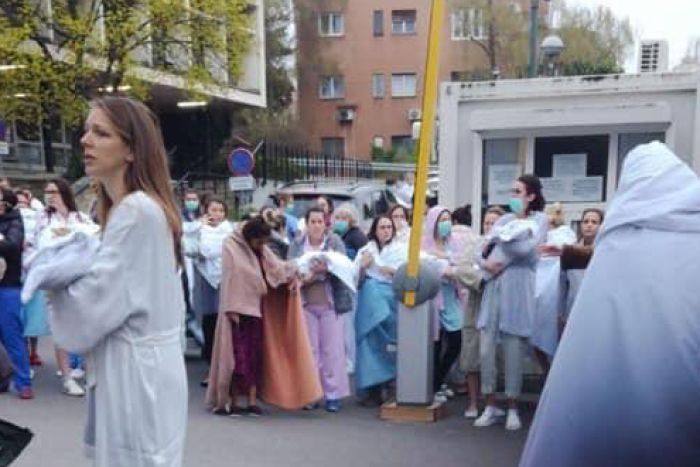
With the corona crisis at its height, the Croatian capital was rocked by a series of earthquakes on March 22, as reported by TCN. Those harrowing pictures of the poor mothers and their newborns went all over the world.
TCN has covered the earthquake and its aftermath extensively, and you can see the entire coverage here, but for this article I want to focus on the response of both the national and Zagreb tourist board in its online handling of the tragedy. Because it was magnificent.
The same day as the earthquake, the national tourist board posted this very moving video, above, with the following message:
"This is my city, my streets, my love. My city with a million hearts... I hope we will smile again, drink coffee with friends and, soon, welcome new friends from around the world who will fall in love with Zagreb, just like I did."
A similar message can be seen on the homepage of the Zagreb Tourist Board.
And then this, the very symbol of the Zagreb skyline, shared by the Croatian National Tourist Board, the removal of the top of the damaged cathedral spires.
Symbols of the Zagreb skyline, the Zagreb Cathedral...
Even without both spires, still, beautiful and strong...
Video by RTL.hr
Thank you RTL.hr
#ZagrebStayStrong #Zagreb #CroatiaFullOfMemories #Croazia #Croatia
Heartbreaking, heartwarming, emotions all over the place. But once one looks at things from a more detached view, how is the Zagreb Tourist Board responding, and how to promote tourism in an age when nobody is travelling?
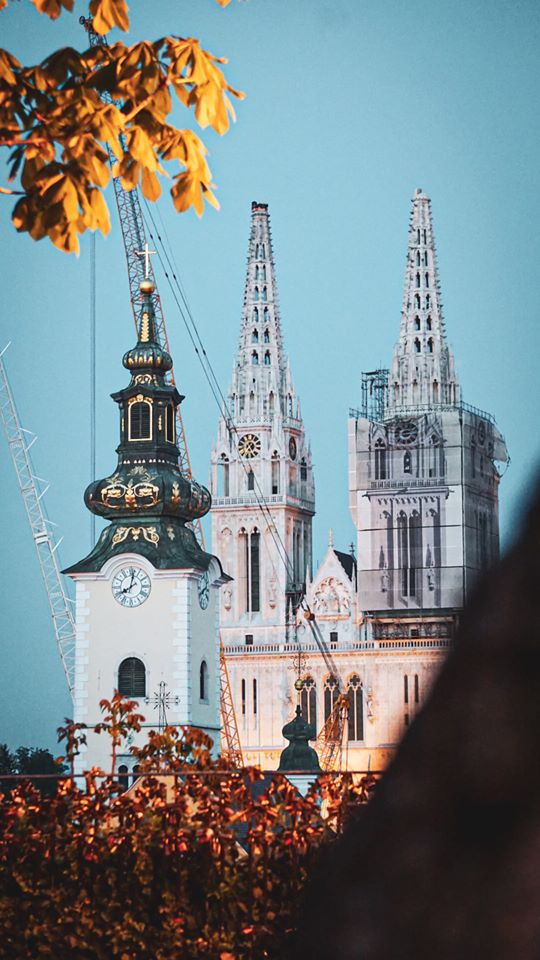
The Zagreb Tourist Board Facebook page became a focal point for the pictures of its residents. Some excellent pictures, such as this one from Bojan Rakic. Check out the Zagreb Tourist Board Facebook page for more.
A few weeks ago, I wrote an article called Tourism in the Corona Age: 10 Virtual Ways to Discover Zagreb. The article looks at the online resources available to explore Zagreb virtually for a future visit, a strategy which the Zagreb Tourist Board has been quietly rolling out in recent weeks, using hashtags #DreamNowTravelLater and #ZagrebLovesYou.
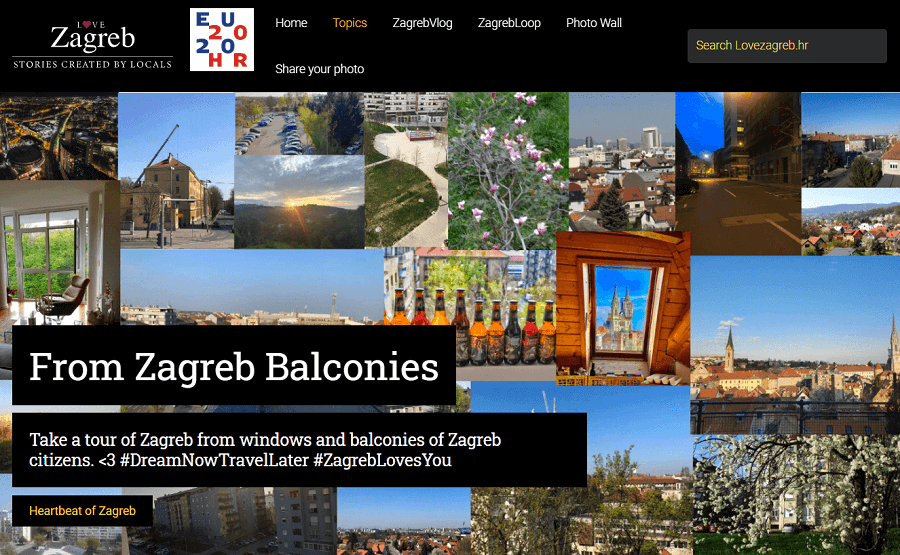
It includes great campaigns such as 'From Zagreb Balconies' where citizens have been sending their balcony views of the Croatian capital - a delightful cross-section of shots of the city, which you can explore here.
The Zagreb Tourist Board has also created a wonderful virtual section on its website called What to Do at Home.
This section is an excellent collection of ways to enjoy Zagreb virtually, from museum tours to theatre productions. You can check it out here.
One of the best resources for understanding the complete situation in this beautiful city under attack from corona and earthquakes is the Love Zagreb blog, another Zagreb Tourist Board project online, which brings the heartbeat of the city into your living room. There were some fabulous texts written in recent weeks. If I could pick out a few to check out, they would be:
Zagreb - A City With a Spirit of Steel
In The Times of Hardship, We Stick Together
You Can Still Have Fun While Staying Indoors
Zagreb's Virtual Farmers' Market
What people perhaps are not aware of is what is happening behind the scenes. I have had several messages from Zagreb tour guides saying that the tourist board had been in contact to discuss how best to promote the city and their agency with whatever online tools the agency had.
Here is one such resource, which our TCN interns filmed quite independently recently, a video guide to the unique Secret Zagreb Badass Women of Zagreb Tour.
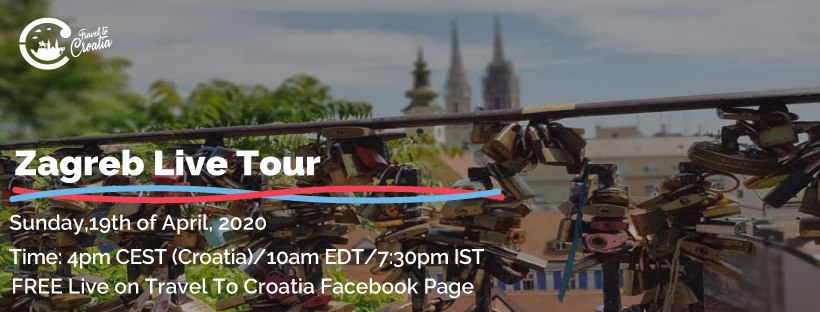
And how about THIS? At 16:00 Croatian time today, there will be a live and free walking tour of Zagreb in English. You can follow it live on Facebook.
Zagreb, the City of a Million Hearts, stay strong in this incredibly trying time.
I, and many other foreigners, look forward to seeing you soon in the flesh.
You can learn more about the virtual and non-virtual offer of the Zagreb Tourist Board on the official website.
First Step Towards Vaccine: COVID-19 Virus Isolated at Fran Mihaljevic Clinic
The first step is towards developing a vaccine against the new coronavirus (COVID-19), as well as many other research and projects, has been taken at the incredible Dr Fran Mihaljevic Clinic for Infectious Diseases in Zagreb.
As Poslovni Dnevnik writes on the 18th of April, 2020, at the Dr Fran Mihaljevic Clinic for Infectious Diseases, which has been the topic of a lot of discussion since the outbreak of the COVID-19 pandemic, they have managed to successfully isolate the COVID-19 virus, that is, they managed to grow the virus under laboratory conditions. Otherwise, this is the first step towards the development of a vaccine against the virus, and for Croatian experts, it provides a much needed spring in their step when it comes to further scientific research into COVID-19.
What they have succeeded in doing in the rest of the world - can also be done right here in the Republic of Croatia. The successful isolation of the new coronavirus has taken place, as RTL reports.
"We have grown the virus under laboratory conditions from a patient swab that tested positive for SARS-COV-2," said a biologist at Zagreb's Dr. Fran Mihaljevic Clinic for Infectious Diseases, Zeljka Macak Safranko.
"First of all, this is a matter of sequencing the whole viral genome [of the new coronavirus], seeing what the nucleotide sequence is like, seeing the differences it has when compared to some other strains, and getting better acquainted with some of its general characteristics. As it grows in the culture, we'll see if it's faster, slower, and we'll get to see just how much it multiplies,'' explained Ivan Christian Kurolt, a biologist at the Dr. Fran Mihaljevic Clinic for Infectious Diseases.
For all you need to know about coronavirus in Croatia, from daily updates on press conferences and the latest news to texts by eminent Croatian scientist Igor Rudan, follow our dedicated section.
Croatian Coronavirus Measures: Who Might Return to Work First?
As Poslovni Dnevnik writes on the 18th of April, 2020, how will we live after the coronavirus measures are eased? Will we be able to go to work, to the dentist or the doctor, or to the hairdresser? Will we be able to have a drink in a cafe? Will we be able to go on holiday? Human health is paramount, and any loosening of the anti-epidemic measures will be in line with the epidemiological situation and therefore there is no need to rush to undo all that has been achieved in Croatia, Vecernji list writes.
Workers from counties that have a good epidemiological situation, but also those whose industries are at risk and are facing a greater number of layoffs, will be able to return to work first. Metalworkers in Međimurje and employees of agricultural and food processing facilities in Slavonia have been mentioned as the possible first returnees to work.
The arrival of tourists in Croatia also depends on the travel regimes of other countries, but the domestic tourism industry is waiting for signs to begin appearing. For the Ministry of Tourism, it is difficult to expect any significant changes until June, the second scenario, after relying on Croatian tourists, would mean relying on grabbing some overnight stays in the second part of the summer and during the postseason, and no one wants to even think about the third, worst scenario.
The safest way to get to the Croatian coast will however be by car. Travelling along Croatia's motorways to the coast this summer will be cheaper than before. The government is considering reducing the price of tolls for the summer months by 10 to 20 percent, primarily to encourage Croatian tourists to go on holidays within their own borders.
Hairdressing salons are likely going to need to wait a little longer in Croatia to open their doors again, and when opened, they will only be able to accommodate a small number of people in them with mandatory safeguards such as full protective equipment and the proper disinfection of all equipment. The first hairdressers will open in Denmark on Monday, then the Austrians and the Germans will follow.
This summer - as things stand - Croatia can quite simply forget about concerts and festivals, Vecernji writes. The way things are at the moment, the borders will remain closed, so you won't be able to enter Croatia or leave the country, the Ministry of Internal Affairs (MUP) stated.
Make sure to follow our dedicated section for all you need to know about coronavirus in Croatia.
Could Coronavirus Pandemic Make Universal Income a Croatian Reality?
As Poslovni Dnevnik/Tomislav Pili writes on the 18th of April, 2020, the decades-old idea of universal income that all citizens would receive, whether they're employed or not, has come back to life once again with the outbreak of the economic crisis caused by the coronavirus pandemic.
Although some economists consider it a necessary instrument for the recovery of economies in general, the second stream of thought nevertheless considers it an entirely utopian proposition.
For the time being, Spain is the country considering the most concrete introduction of universal income. The Spanish Government wants to accelerate the introduction of "universal income" to help people who have lost their income due to the coronavirus pandemic.
"Because of this crisis, we need to urgently discuss universal income. It's essential if we're to guarantee the dignity and minimum purchasing power of many Spanish families who are now in dire straits,'' Deputy Prime Minister Pablo Iglesias, leader of the left-wing Podemos, told national television on TVE last week.
Among the last to take up the idea publicly is no less than Pope Francis. Pope Francis suggested the idea of universal income because "the poor and all those who have been excluded from society are paying and will continue to pay the most,'' in the ongoing coronavirus pandemic. All in all, universal basic income is far from some sort of new idea.
It's based on the premise that all citizens of the state will be paid a certain amount of money each month, regardless of whether they're employed or looking for work, and regardless of their age group. This should provide social security in an era of rapid robotisation and automation.
It has also been defined by the International Monetary Fund (IMF) as a revenue support mechanism in which cash payments are provided to the entire population, or at least a large portion, without or with minimal conditions implied. Guy Standing, a professor at the University of London and a long-time proponent of the idea, pointed out to CNBC that he believes coronavirus could be the trigger for its introduction in more countries across the world.
In his view, there will be no global economic recovery without the introduction of universal income, and sooner or later, the world will have to introduce some kind of basic universal income for all citizens.
However, Luka Brkic, a professor of international economic relations at the Zagreb Faculty of Political Science, is very skeptical of the idea that universal income will become a reality. He clarified that it was completely understandable that the advocation of such an idea comes from a moral authority such as Pope Francis. "But it has nothing to do with the economy," Brkic pointed out.
"In the conditions of a world organised into nation states, the introduction of universal income is practically impossible because national interests are primary," Brkic stressed, asking what the source and fundraiser for such income be on a global scale. In theory, universal income can be introduced in any country, including here in Croatia, providing that there is political will for it.
A study by the Roosevelt Institute showed that, in the American scenario, there would be economic growth due to the greater availability of money in the market. However, the most famous universal income experiment, the one in Finland that ended back in 2018, showed that there was no shift in employment growth - none whatsoever.
Only unemployed Finns between the ages of 25 and 58 were included, who received state aid in November 2016 and were selected by random sampling.
Participation was compulsory and the net basic income level was set at 560 euros. The survey results showed that the experiment participants were no more successful on the labour market than those who received “ordinary” unemployment benefits.
With the differences highlighted between the Finnish and the American scenarios, could Croatia be the next to toy with the idea of the introduction of universal income more seriously as the coronavirus pandemic continues to wreak havoc with its tourism-based economy? The questions are both moral and economic, and it will be interesting to see how things play out in the wake of the pandemic.
Make sure to follow our lifestyle page for more.
Good News from Germany: Croatia on Radar for Tourists Traveling by Car
April. 19, 2020 - Will there be any tourism this summer? This is the golden question being asked not only in Croatia, but also in the rest of Europe. However, according to the first signs, Croatia could profit as an auto-destination thanks to its proximity to central Europe.
"This tourist summer will certainly be completely different from everything we've known so far," says the president of the Alliance of German Tour Operators, Norbert Fiebig, in an interview with Tagesspiegel. He predicts that unless travel restrictions are lifted, many will be spending this summer at one of Germany's tourist centers, Deutsche Welle writes and Slobodna Dalmacija reports.
If the borders do open at all, the goal for European tourists will be to European countries - and in this sense, the closer, the better. Croatia, which is only a few hours away by car from southern Germany, could certainly reap the benefits of this.
"And in European countries that have carried out the second phase of combating the spread of the infection, travel will be possible under certain security conditions," says Fiebig.
TUI, Europe's largest tour operator, is signaling that they are ready to organize trips as soon as the countries in question give the green light.
"TUI is currently in talks with the governments of many tourist countries, which are preparing during the pandemic so that guests can return as soon as possible," TUI said when asked by AFP.
The position of German Foreign Minister Heik Maas also argues in favor of the theory that tourists will initially choose destinations closer to home.
"Of course, as soon as circumstances change, we will allow travel. But I can only lift the warnings if I am sure that citizens will be able to return to Germany on a regular basis," Maas said, pointing to a substantial, complicated (and expensive) action of returning German tourists home from different parts of the world.
Fortunately, destinations in the Mediterranean, such as Croatia, because of their proximity, do not fall into the category of countries in which return flights need to be organized.
These aspects, according to Norbert Kunz of the German Tourism Association, could, in the future, play an increasing role in choosing a holiday destination. For him, the important question is whether tourists will want to stay near their homes in the future in order to risk as little as possible in case they need to return home quickly.
"What role does safety play, including medical safety, in the place where we spend our holidays? These are all issues that we will deal with more intensely in the future," Kunz tells public service ARD. The crisis caused by the coronavirus pandemic could have far-reaching consequences for tourists, Deutsche Welle writes.
As far as the future is concerned, Kunz believes that the tourism industry will certainly not come into full operation this year but only next summer. The same is true in Spain, where the government has told tourism workers that the industry, if at all, will only be able to count on activating demand at the end of the year. But Kunz is optimistic in the long run:
"The citizens' longing to travel abroad will continue to exist. That is not out of the question."
In other news, Jutarnji List reports that Austria could allow tourists from Germany and other countries where the coronavirus is under control to visit Austria in the summer, Tourism Minister Elisabeth Koestinger said on Saturday.
German tourists accounted for more than 30 percent of arrivals last summer in Austria, according to official statistics.
The share of tourism in Austria's GDP is one of the largest in the EU.
"Freedom to travel will remain limited in the coming months.
However, if countries are successful (in the fight against the coronavirus), such as Germany, there is a real chance of bilateral agreements," Koestinger told the Saturday edition of the Austrian newspaper Die Presse.
Conservative Prime Minister Sebastian Kurz said Austrians should consider vacationing in their country to help the economy.
"However, without foreign tourists, we will have to bear the losses," Koestinger added.
By the end of April, the government plans to present a plan for the gradual opening of the restaurant and tourism sectors.
From Tuesday, garden centers and retail spaces of less than 400 square meters have were opened in Austria, which, as well as larger shops, though masks are required.
Masks are also mandatory in public transport and in taxis.
To read more about travel in Croatia, follow TCN's dedicated page.
How the 1855 Cholera Epidemic on Hvar Paved a Street in Stari Grad
April 18, 2020 - A lovely story from Stari Grad on Hvar about how the cholera epidemic of 1855 was responsible for the cobbles coming to Srinja Kola street in this 2,400-year-old town.
Here is a story about the cobbles of Srinja Kola street in the old town of Stari Grad.
How Middle Street Got Its Cobbles
It just goes to show that while history may not exactly repeat itself, it certainly does rhyme. While Mark Twain may not have had epidemics in mind, this episode proves him correct. Thanks go to Hvar Island Concierge for the story, and to Zdravko Podolski for the eagle eye at spotting it, as well as this translation.
Dinko Gazzari and Marko Niseteo, were doctors responsible for conquering the cholera epidemic that plagued Stari Grad on Hvar in the summer of 1855.
For their contribution they were due to receive gold medals, but they declined and suggested that instead the Middle Street (Srinja Kola) should be paved. Instead of a muddy creek in winter and a dusty mess in summer it got paved in beautiful stone cobbles. (Depicted here in the photo by Vilma Vodanović.
At that time people were hiding in huts and trims (stone field shelters) outside town, and boats anchored in the bay. In shops, coins were dropped into bowls of vinegar, and everyone was careful not to touch anyone else. Strict isolation of all local settlements prevented mass deaths, except in Dol which was loose with its quarantine and several villagers died, and their houses were burnt to prevent the disease spreading. The Gendarmes were very active, and mention should also be made of pharmacist Peter Confalonieri and mayor Peter Scuttari.
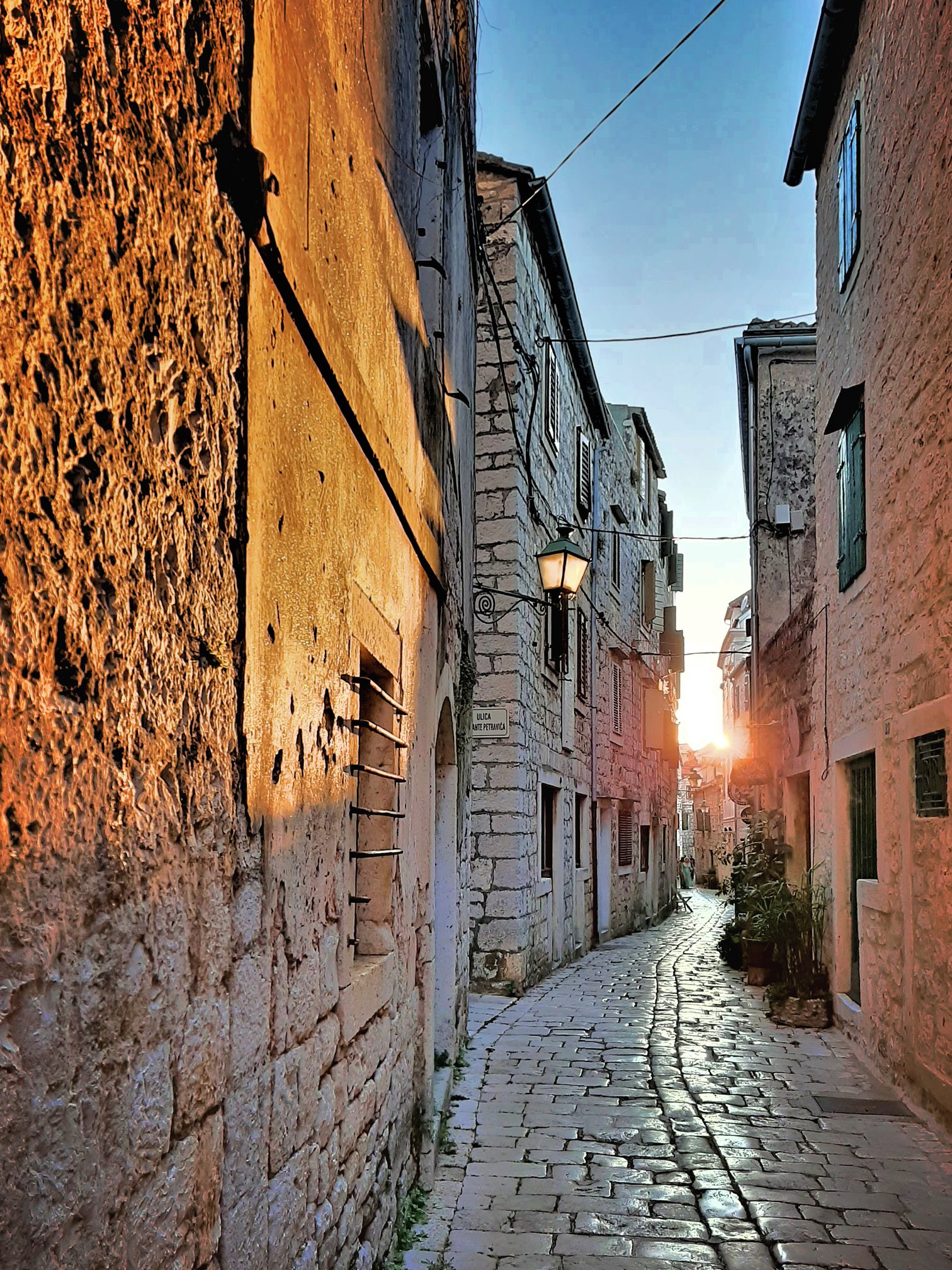
Thanks Hvar Concierge and Zdravko - great story.
And to see how the gorgeous old town of Stari Grad is faring in the corona era, here is yesterday's look at life under lockdown in Stari Grad.
Hvar Supermarkets in the Corona Era: How are Supplies?
April 18, 2020 - The brief panic buying seems to have subsided and supply chains have realigned to a new corona rhythm. So how well-stocked are the Hvar supermarkets, for example?
One of the things we had to think about when deciding to self-isolate on Hvar where our original home is or in Varazdin where we are currently renting was the availability of supplies.
I was not personally too worried about essential supplies running out. In times of crisis, I can think of few places in the world that manage a crisis better than Croatia. From the stories I heard of the war years, the solidarity and togetherness was an important factor in survival during those years. But islands would obviously not be as well-stocked as the mainland. On the other hand, access to the fresh produce from the family field was a major plus factor.
We decided on Hvar and decided not to panic buy. What will be, will be.
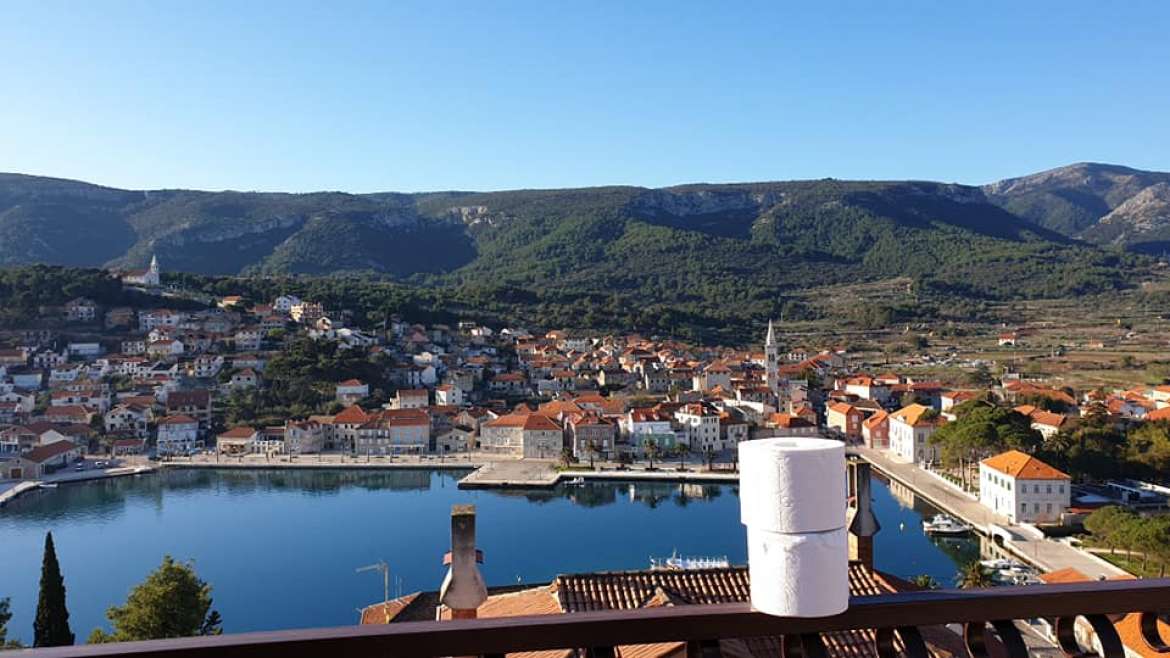
We bought only 20 toilet rolls with us, for example, and as we explored in Toilet Paper, Toilet Paper, My Kingdom for Some Toilet Paper, when you are the only male in a family of four, your allocation from 20 rolls of toilet paper is exactly two.
So one month later, how am I coping? Have we all panic bought the Australian way?
Until yesterday, my life had been confined to my laptop apart from lunch and 30 minutes by the Adriatic each evening. I had had no meaningful discussions with anyone outside for my self-isolation team of 7 for a month. Today I went to see how the situation is in Hvar supermarkets.
As you can see above, no dunny roll crisis here.
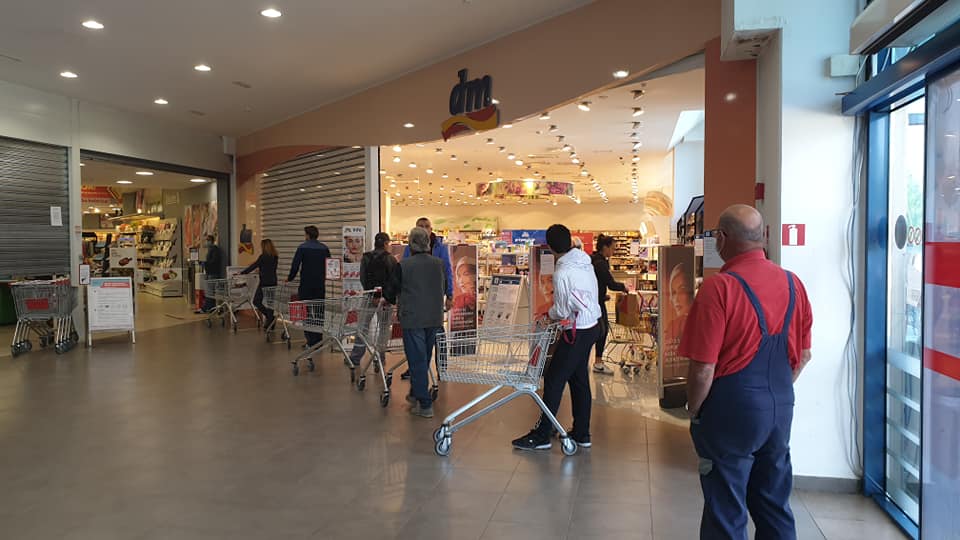
We queued as per the regulations and waiting until our turn came, the obligatory social distancing and hand sanitising before we entered.
I was shocked at what I found inside and I started to film so that others could see the reality of life in Hvar supermarkets at the moment. I was asked by the staff not to film or publish any film online, so sadly I cannot share that with you, and the only photo from inside the store is the toilet paper above.
But I have never seen Tommy, the biggest of the Hvar supermarkets, so well-stocked. I looked around for what might be missing, but did not find anything. Items such as fresh salmon were a surprise.

Whoever is in charge of the supply chain is doing an incredible job.
As to are the authorities, who are providing maximum protection for the island at the ferry terminals, which allowing essential travel to maintain supply levels. Here is the evening ferry from Split to Stari Grad last night.
And there is also an excellent online option for islanders on Hvar, Vis and Solta - the Ponuda Skoja (Island Offer), allowing you to order the island's best domestic produce for home delivery. You can learn more on their Facebook page.
So to summarise the current state on Hvar, I would say that we are safe, well-stocked and able to sample the best of local produce. Many thanks to all those who have made that possible, and long may it stay that way.
I will be documenting the island of Hvar under lockdown in the coming days. The first report went out this morning - A 3 Video Tour of the Stari Grad Lockdown on the Island of Hvar.

